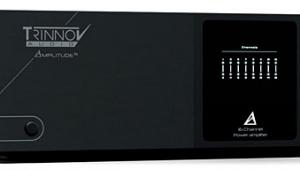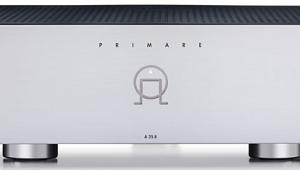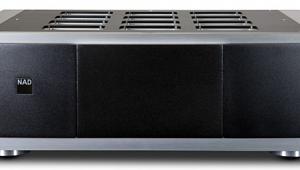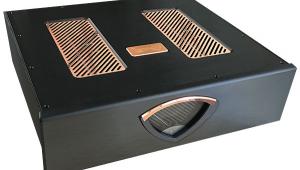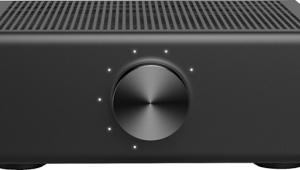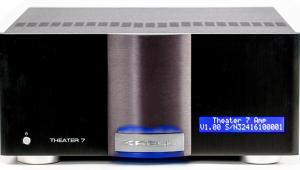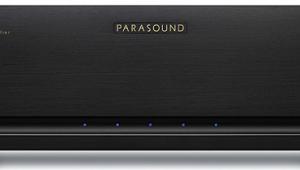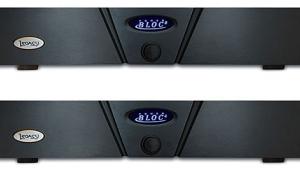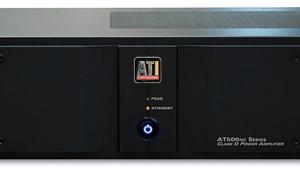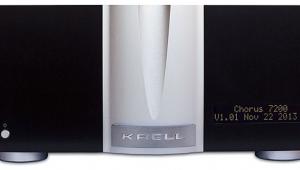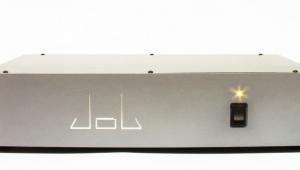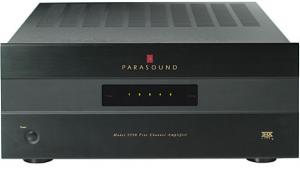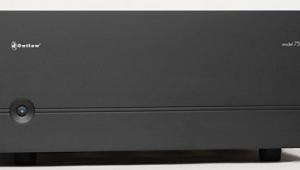Holy hell--that's dead silent. I was perusing through prior HT mag, er, I mean sound and vision reviews and only the Brytston 9B SST2 came close.
ATI AT6005 Amplifier
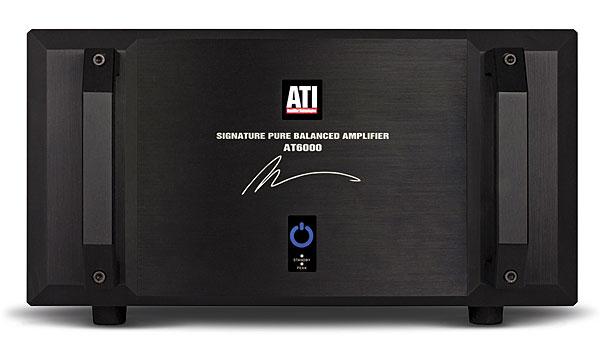
AT A GLANCE
Plus
Outstanding dynamics and headroom
Equal power to all channels
Seven-year transferable warranty
Minus
Very, very heavy
Recommended for two independent 20-Ampere power outlets
THE VERDICT
This amp never broke a sweat driving my 4-ohm speakers at insanely loud levels.
There are quite a few people in the audio world who have become household names, at least among audiophiles. I’m talking about legends like Paul Klipsch, Amar Bose, Saul Marantz, Henry Kloss, Bob Carver. But these aren’t the only influential contributors to the business and history of hi-fi. Among the lesser-known audio icons is Morris Kessler, the founder of ATI.
Kessler started in 1959, working in a retail hi-fi store at age 15, and he designed his first solid-state amplifier at 18. He co-founded his first company, SAE (Scientific Audio Electronics), at 23 and sold it in 1988. In the early 1990s, he founded ATI and landed his first OEM customer with the release of Adcom’s GFA6000. Over the ensuing years, ATI would work quietly behind the scenes, manufacturing amplifiers for the likes of Crestron, Theta Digital, and Outlaw Audio. What’s even more impressive is that all of those amps have been made in the U.S.A.
High Standards
ATI’s design philosophy is simple: Audio quality is their first priority, and they pay particular attention to signal-to-noise ratio and THD+noise performance
in an effort to minimize intrusions on the signal purity. I’ve heard a number of Kessler’s OEM amps over the years, but the AT6005 sets a new standard for the company. In fact, ATI is so proud of this amp that they’ve put Kessler’s signature across the front. Given its modular construction, it’s available
in two-, three-, four-, five-, six-, and seven-channel versions, all featuring the same audio circuit and per-channel power output, and with prices ranging from $3,995 to $7,995.
From the outside, the five-channel AT6005 looks like your typical black-box amplifier. The front panel sports two removable handles and a power switch. The rear has both balanced and unbalanced audio inputs (with a toggle switch to choose which input method you prefer), five speaker outputs, two detachable power cords (more on this later), a ground screw, and a trigger input to automatically turn on the amp from a switched component.
While the exterior isn’t much to write home about, the inside tells the true tale of this signature design, and Kessler has delivered in spades. The AT6005 is a fully balanced design with differential amps, but unlike Kessler’s earlier models, which were essentially bridged amplifiers, this baby uses only a single input stage with dual-differential output stages, resulting in improved signal-to-noise ratio. It’s rated at 300 watts RMS x 5 into 8 ohms (450 watts RMS at 4 ohms), and Kessler has implemented a new design topology utilizing current feedback in lieu of the more commonly used voltage feedback. This makes for wider bandwidth (the only valid way one amp can be said to be ‘faster’ than another) and potentially lower harmonic distortion.
Other engineering highlights include ThermalTrak output devices (helpful in optimizing the operating bias in real time), dual DC servos to track and maintain DC offset, and a revised PCB layout that moves the AC components on the modular cards away from the signal input. What’s more, the amp uses dual toroidal transformers, dual power switches, and dual line cords, creating a design that can be hooked up to two independent 20-amp circuits for greater sustained power output.
Needless to say, the specs on this amp are through the roof. But how does it sound?
Setup and Real-World Performance
At 116 pounds, the AT6005 is a two-man job to maneuver into your rack, unless you’re Thor. Once it was in place, I hooked it up to my Marantz AV8801 preamp via balanced connectors. I followed ATI’s advice and plugged the amplifier into two independent 20-amp outlets that I had fortuitously run last summer to my rack.
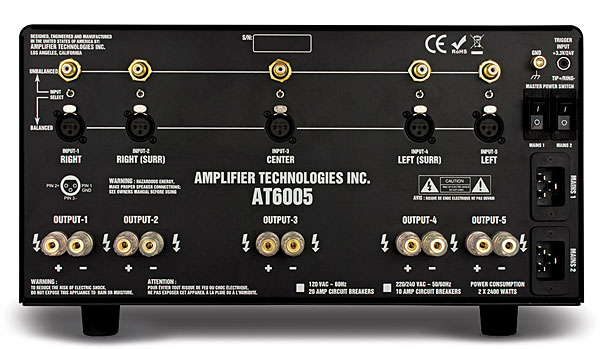
My reference speakers consist of three M&K S150s across the front and four SS150 surround speakers, but since this was the amp’s five channel-channel version, I went with a 5.1 system for the duration of the review. All of the M&K speakers are rated at 4 ohms nominal and have been known to tax an amplifier or two. Since my speakers are studio monitors, they do require a subwoofer to provide low-end extension. In this case, I employed an SVS PC-Ultra and an M&K X-12. Once everything was in place and hooked up, I calibrated the speaker levels manually using a THX test-tone disc and a RadioShack SPL meter.
Lost is one of my favorite TV shows of all time, not only for the stellar cast and the numerous twists and turns but also for the engrossing score by Michael Giacchino. The sixth and final season features some great instrumentals, with “LAX” starting as a slow piano solo before adding various strings along the way and building to a crescendo midway through the track. I’ve listened to this countless times, and the AT6005 handled the peaks of the crescendo effortlessly. Furthermore, the strike of every key on the piano sounded almost like the instrument was sitting in my room. Every bit of clarity and detail was left intact, and the ATI didn’t colorize the sound in any obvious way; everything was clear and natural, as it should be.
Movies were just as enjoyable. Starting with something lighthearted and fun, I popped in the Blu-ray of Frozen, one of the best animated titles from Disney in years. As I jumped through the various musical numbers on the disc, the ATI proved to be up for any challenge. At reference levels, the Oscar-winning song “Let It Go” sounded amazing. Piano keys were crisp and clear, and Idina Menzel’s vocals were controlled and never approached any hint of strain. Furthermore, I could clearly hear every drop of the ice crystals as Princess Anna built her majestic castle.

Marcus Luttrell and his compatriots of Operation Red Wings are American heroes whose story comes to life in the Oscar-worthy (yet mostly neglected) Lone Survivor. Based on Luttrell’s best-selling book, the movie allows you to witness the deadliest day in Navy SEAL history as this band of brothers fight for survival on an Afghanistan mountainside. This is an emotionally powerful movie, and for us audio enthusiasts, the DTS-HD Master Audio 5.1 track is about as kick-ass as they come. Discrete effects fly throughout the room as bullets crash all around you, and every gunshot tests the prowess of your equipment. Needless to say, the ATI was more than up for the task. If I were blindfolded during the experience, I definitely would have been ducking for cover.
My two-channel audio auditions with the ATI were no less impressive. The amp’s prowess was quite evident on Sir Colin Davis’s rendition of Beethoven’s Symphony No.3 “Eroica” at the Semperoper Dresden (Philips)—a gem of a recording. The final movement is thrilling as the piece builds to its triumphant conclusion, and the Dresden State Orchestra sounded as if they were sitting directly in front of me when I closed my eyes. The midrange was clean and precise, the high end extended, and the hall was reproduced with inviting ambience. The ATI handled the piece’s powerful dynamics with uncommon ease, even at real concert hall levels.
Conclusion
My reference amplifier for a 5.1 system is a John Curl–designed Parasound Halo A 51. I purchased this amp last spring after wanting to own it for more than 10 years, and I consider it to be one of the best amps that money can buy. The highest acclaim I can give the AT6005 is that at no time did I miss my Parasound during my audition of the ATI, which is something I honestly didn’t expect. In fact, if I were in the market for a new amp, the ATI would be at the top of my list, due to its low noise and seemingly endless power output. Highly recommended.
- Log in or register to post comments


This amp cannot even reach is claimed rated load with all channels driven unless its at 1% which is hardly audiophile. For the same money you could buy a Emotiva XPR-5 which is 400 WPC X 5, a Emotiva XPR-2 which is 500 WPC X 2. Both of these amps have more power and lower SN ratios and distortion. There is still enough money left over to buy Emotiva's flagship made in USA Prepro, the XMC-1. What a 7.1 system for just the price of the 5 channel ATI amp. No brainer to me...

Full power output for an amplifier like the AT6005 requires a high-power Variac (or in this case two Variacs) to insure line voltage remains at 120 volts. Otherwise the line voltage will sag and effect the measured output and THD.
Having seen many full power plots of our Signature amplifiers where supply voltage is properly maintained, the results reported here show reduced power output/increased THD due to sag in the line voltage.
When AC is properly maintained at 120 volts, these amps do achieve their rated THD and power output.
Jeff Hipps
Amplifier Technologies, Inc.

What do you mean? Isn't two seperate 20amp outlet enough?

For normal operation, even a single 20A circuit is sufficient.
It is only for performance verification and testing where the power supply voltage must be maintained at 120V that Variacs are necessary.
Jeff

How about those of us who rent and can't have a 120 line installed?

Dear great but...
In the vast majority of installations, the AT6002 will work perfectly with both cords plugged into a single 15A outlet--as you have in your apartment.
For example, we just ran our entire CES Auro-3D/Atmos demonstration which included 7000 watts of amplification on the two 15A circuits provided in our suite at the Venetian Hotel.
Jeff

